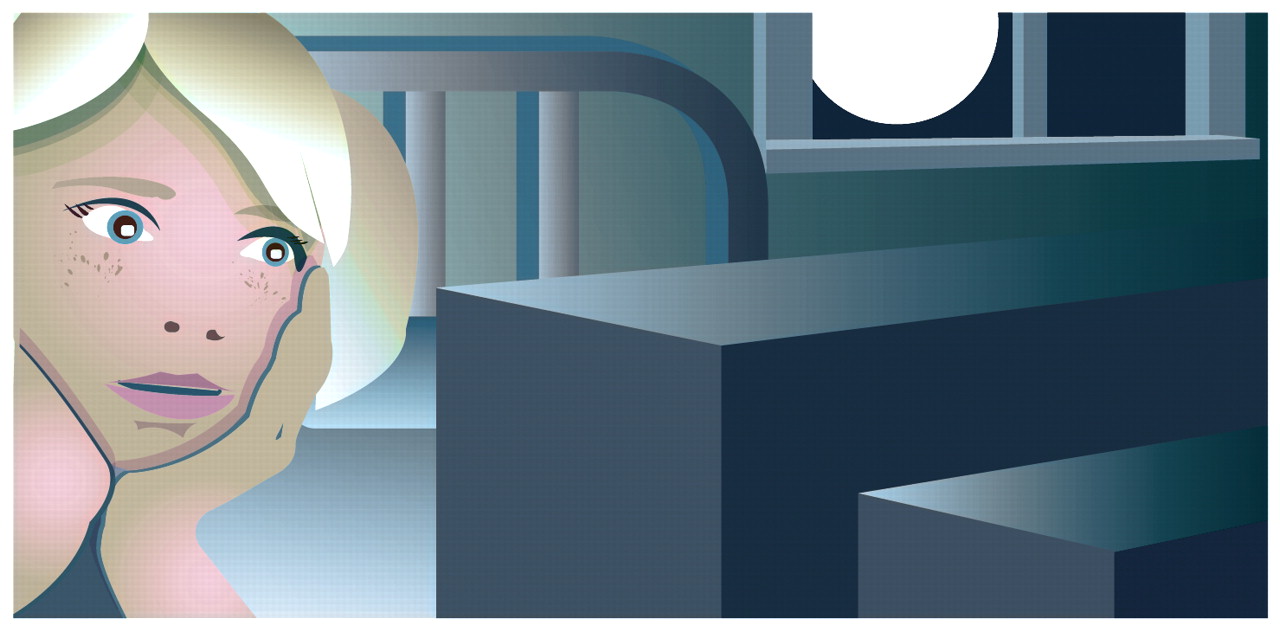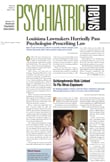Sleep disorders may mimic or worsen psychiatric disorders; moreover, many psychiatric medications affect sleep adversely. Afternoon naps at school, even for 4-year-olds, don’t make the grade for some educators. Children attending full-day prekindergarten programs—on the rise nationwide—“need to get rid of all the baby school stuff they used to do,” Prince George’s County, Md., schools chief André Hornsby told Maryland legislators recently, according to a report in the
Washington Post.“Banning naps is like taking vegetables out of these children’s lives,” countered Jodi A. Mindell, Ph.D., associate director of the sleep disorders center at the Children’s Hospital of Philadelphia.
The tactic also is counterproductive, Mindell said. Sleep-deprived children are cranky, irritable, and unable to concentrate. “They won’t gain that half-hour of naptime,” she asserted. “They’ll lose the entire afternoon.”
American children aged 10 or younger already get less sleep every day than sleep specialists advise, said Mindell, who chaired the National Sleep Foundation’s (NSF) 2004 Sleep in America poll. This nationwide telephone survey of 1,400 parents or other primary caregivers of children aged 10 or younger is said to be the largest study to date of children’s sleep.
Poll results, released in March, show children aged 3 to 6 years average 10.4 hours of sleep daily. While individual sleep needs vary, sleep specialists suggest most children in this age group need about 11 to 13 hours of sleep a day. About 26 percent of 4-year-olds nap every day.
For most children aged 3 to 11 months, the recommended amount of sleep is 14 to 15 hours; for ages 12 to 35 months, 12 to 14 hours; and for ages 7 to 10 years, 10 to 11 hours. Across age groups, children averaged about 30 to 60 minutes less sleep than recommended.
The developing brain needs sufficient sleep, noted Ronald Dahl, M.D., the Staunton Professor of Pediatrics and Psychiatry at the University of Pittsburgh Medical Center. Sleep benefits learning and memory in the broadest sense, he said. It’s vital for cognitive processing and procedural and emotional learning.
A bidirectional relationship exists between sleep and behavioral/emotional regulation, Dahl said. Insufficient sleep interferes with self-control of behavior and mood, and problems with behavior and mood can undermine sleep.
Epidemiological surveys suggest about 25 percent of children have sleep disorders. The NSF poll found, however, that 2 in 3 children have trouble falling asleep, awaken at night, snore or have trouble breathing, wet the bed, convey nighttime fears, have nightmares, or experience other problems with sleep several times a week.
About 1 in 3 children, including 14 percent of school-aged children, awakens in need of help or attention at least once a night. Parents or caregivers report that about 1 in 4 children ages 6 and under seems sleepy or overtired in the daytime.
To researchers’ surprise, however, only 11 percent of parents or caregivers said “yes” when asked, “Does your child have a sleep problem?”
“There’s a disconnect here,” Mindell asserted. Parents or caregivers see problem behavior but often don’t realize it may signal a sleep disorder. In more than half of pediatric visits, physicians fail to ask about the child’s sleep. That’s a serious oversight, Mindell noted, since most children’s sleep disorders are treatable.
Psychiatrists who see children also need to have sleep on their radar screen, advised Judith Owens, M.D., M.P.H., director of the pediatric sleep disorders clinic and the learning, attention, and behavior program at Hasbro Children’s Hospital in Providence, R.I.
Look for underlying or comorbid sleep problems in any child who presents with behavioral, affective, mood, anxiety, or attentional problems, she suggested.
Primary sleep disorders, including sleep apnea, restless legs syndrome, or periodic limb movements, may account for much of the child’s symptomatology, Owens said. Sleep clinic studies show these problems are far more common than most physicians suspect.
Psychiatric Symptoms Exacerbated
Comorbid sleep disorders may exacerbate daytime symptoms of many psychiatric disorders, particularly attention-deficit/hyperactivity disorder (ADHD). Fidgeting and restlessness attributed to ADHD also may be behavioral manifestations of sleepiness. “Sleep deprivation and psychiatric disorders show a huge overlap in their effects on prefrontal cortex executive functioning,” Owens said.
Children with ADHD typically have more trouble falling asleep, take longer to fall asleep, awaken more often, and are harder to rouse in the morning than control subjects. Actigraphy studies show children with ADHD have greater night-to-night variability in the time they go to bed and get up, and in the total amount of sleep they get, compared with control subjects. (Actigraphy is used to measure sleep quantity and quality in people who may have a sleep disorder. Data are collected via a device that looks like a wristwatch.)
About 60 percent of the children Owens sees in her ADHD clinic, a referral population, have significant sleep problems, often related to medications used to treat ADHD or to comorbid conditions such as anxiety or depression.
In prescribing medications for ADHD, asthma, and other illnesses, Dahl reported, clinicians often target symptoms of the primary disorder and do not think about sleep. “It’s a background issue rather than a foreground issue,” he said.
He cautioned against prescribing hypnotics for children, however. “We don’t understand enough about which aspects of sleep are truly restorative and exactly how these agents work,” he said. “It’s also hard to change sleep with a primarily pharmacological approach.”
Behavioral techniques, though time consuming to implement, work better long term, he said. The physician needs to persuade the family to remove the television, telephone, video games, and similar distractions from the child’s bedroom; modify bedtime schedules; restrict caffeine; and avoid family conflict at night.
According to the NSF poll, 43 percent of school-aged children and 30 percent of preschoolers have a television in their bedrooms. These children go to sleep about 20 minutes later and sleep less overall than those without a television in their bedrooms. Parents and caregivers reported that more than half of these children have one or more sleep problems. And about 1 in 10 school-aged children has a telephone and computer in the bedroom.
Additionally, 26 percent of children aged 3 and older consume at least one caffeinated beverage, typically a soft drink, every day. These children get about 3.5 hours less sleep each week than those who do not drink such beverages.
Parents’ Sleep Affected as Well
Children’s sleep problems, not surprisingly, disrupt the sleep of parents and caregivers, who averaged about 6.8 hours of sleep a night. Two-thirds of parents and caregivers said they are not able to get as much sleep as they need. Earlier NSF polls showed American adults average about seven hours of sleep, an hour less than sleep specialists say most adults need to feel and function optimally.
Sleep-deprived parents feel stressed and often angry, Dahl said. A child’s sleep problem may cause conflict between parents. Advice from a mother-in-law, friend, or even a physician may escalate tension. Parents may communicate their distress to their child at an important time of learning about emotions, leading to negative parent-child interactions.
Parents of children with severe sleep problems have told Dahl they came close to expressing inappropriate anger toward their child. “My strong clinical impression is that such reports reflect the tip of the iceberg,” he said. In some parents, frustration over struggling to get a child to sleep may precipitate shaken-baby syndrome or other child abuse.
Physicians should aim to shift the spiral to a positive direction, Dahl said, by helping parents manage feelings better and promoting parent-child bonding at bedtime.
In extreme situations—caring for a child with severe physical and mental handicaps—parents often do a wonderful job of coping 16 hours a day, Dahl said. But if they can’t get the sleep they need because their child is up at night and at risk for self-injury, the child’s sleep problems can tip the balance toward institutional care.
Owens, Mindell, and Carol Rosen, M.D., of Rainbow Babies and Children’s Hospital in Cleveland recently surveyed members of the American Academy of Child and Adolescent Psychiatry about their use of pharmacological treatment for children with significant difficulties initiating and/or maintaining sleep. While data analysis is still in progress, the same researchers found in a previous survey that community-based pediatricians frequently prescribe or recommend sedatives and hypnotics for children with insomnia, especially children with ADHD, mental retardation, or autism. They reported these findings in the May 2003 Pediatrics. ▪

